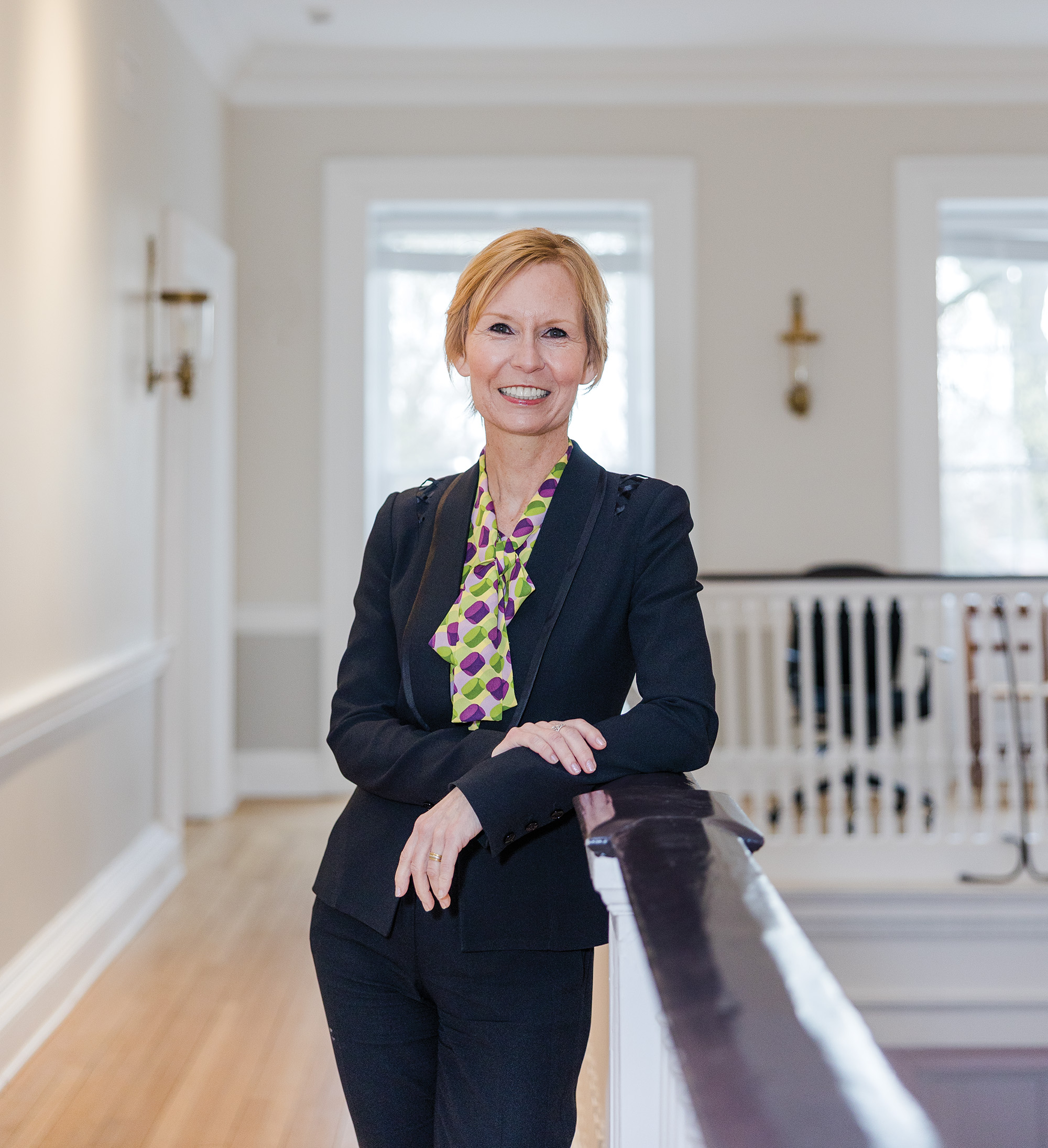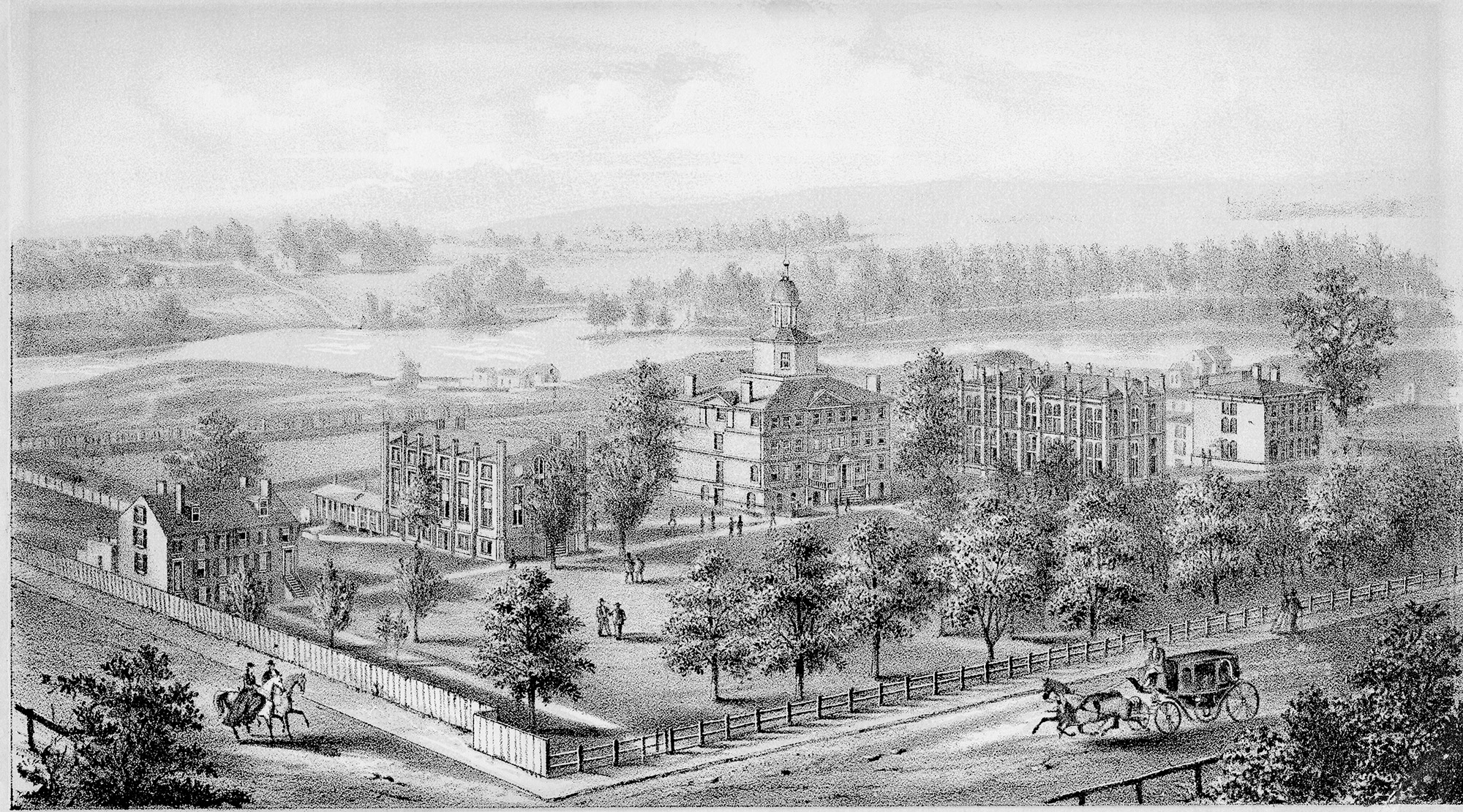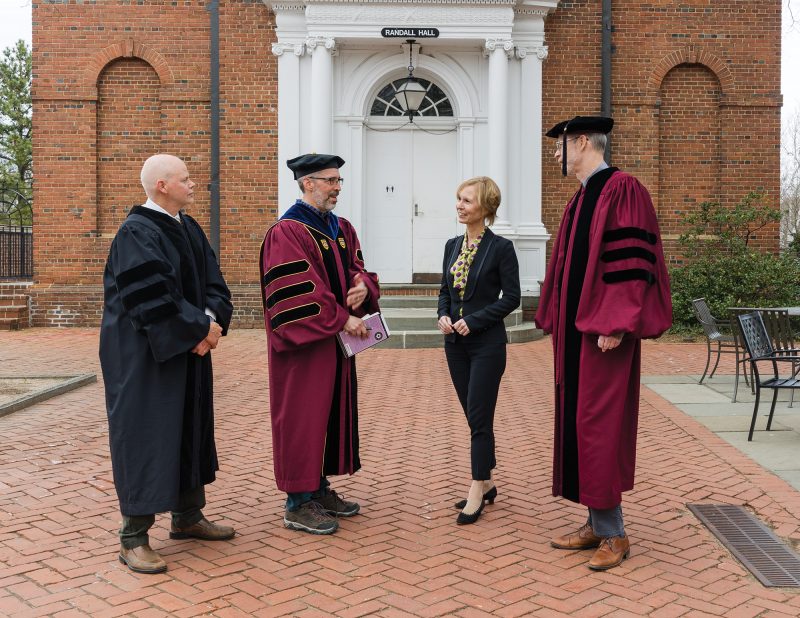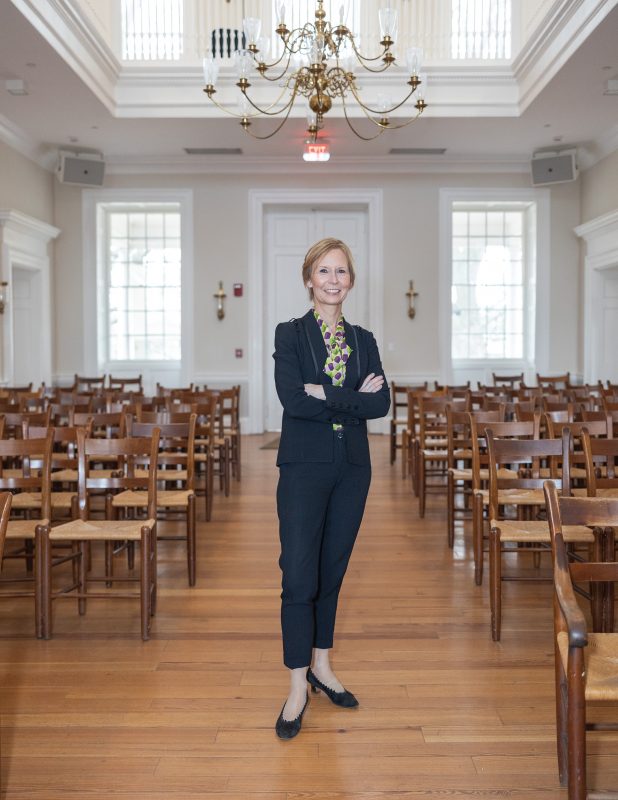- © 2025 Annapolis Home Magazine
- All Rights Reserved
By Robert Haywood and Kymberly Taylor | Photography by Donna Weaver

Reflect on this known fact for a moment: right here in Annapolis, St. John’s College is the third oldest college in the United States, founded in 1699. Four of the college founders signed the Declaration of Independence—those words on paper that still define this country’s foundational values. Studying St. John’s illustrious history is a trip through American history itself. We celebrate the college today for a central facet of that history: the school’s unwavering embrace of a classic liberal arts education.
St. John’s has maintained its educational tradition with a rigorous focus on the most profound philosophical texts, literary classics, and music that have shaped our culture and understanding. As a key facet of its liberal arts educational mission, St. John’s operates The Mitchell Gallery, an important art museum in Annapolis which has enormous potential to grow and advance the visual arts in the city and beyond.
We live in a time when people can publicly blurt out any assortment of arbitrary and unsubstantiated claims on the internet. Such claims, including the most ominous ones, often find followers, too. Yet, the type of education that St. John’s offers—the one our democracy demands—requires something far different: assertions grounded in evidence, presented with sustained reason, and directed toward truth.
For this reason alone, you can look at St. John’s as offering an entirely practical education. Who will write the future texts that will guide us, the texts that will define, alter, interrogate, and free the way we think about and see ourselves in the world? We surely want such persons to be deeply well-read.
In January 2022, Nora Demleitner assumed the role of President of St. John’s College. President Demleitner is completely prepared to lead St. John’s, both preserving its liberal arts tradition and guiding its way forward. She is the first woman president at an institution that began as an all-white male school. She is a distinguished legal scholar with a Yale law degree and possesses a long teaching history in higher education.
As you will discover in this interview conducted by Kymberly Taylor and myself, she is also fully committed to St. John’s mission. President Demleitner possesses the character and passion to ensure St. John’s advances its commitment as a liberal arts college. That is good for present and future students, yes, but it is also essential for our country and the world.
This interview was conducted on April 28, 2022 and has been slightly edited for brevity.

Lithograph of the St. John’s College Annapolis, Maryland, Campus by A. Hoen & Company, [ca. 1858]. Courtesy of St. John’s College.
Robert Haywood: What have you learned about St. John’s since you arrived in January 2022 that you didn’t know previously?
President Nora Demleitner: I don’t think I fully understood how important a part of the community it is, how long the ties have been, and how extensive they have been to the city of Annapolis, to the county, and to the whole state of Maryland, really—going back over a very long history, of course. Also, I didn’t know how integrated, especially our students seem to be with the city.
I think the other thing is the Graduate Institute. I did not focus on that when I interviewed initially because we talked so much about the undergraduate side. We have a much broader curriculum than just the undergraduates, although, of course, that is the core of our educational model.
Kymberly Taylor: Expanding on your first answer, do you have plans to integrate St. John’s even more and highlight its profile in the community?
Demleitner: Part of my goal is to make St. John’s a full part of the community and the community a part of St. John’s. Admittedly, I think the very first time I was in Annapolis with my children, we walked past St. John’s and then had to backtrack. Between the legislative buildings and the Naval Academy, it feels like it could be part of either.
I do want to be sure that people understand we’re an educational community. It’s not a park; it’s a college. But that doesn’t mean we are closed off from our surroundings because I think some of our history seems to be a little bit inward-focused. I do want to be sure that we are open to the community while at the same time we’re focusing on our own educational programs.
Taylor: What do you think you bring to St. John’s that’s different from previous presidents?
Demleitner: Jokingly, I would say gender.
I don’t personally think it is that much of a difference, but sometimes I see how the outside world reacts to that. St. John’s only admitted women 72 years ago. I think it is a change. We all know that literature tells us that women do often think differently.
We also haven’t had a lot of presidents who come out of higher education for a long period of time. I think it’s somewhat different because you think about higher education differently. I think being trained as a lawyer makes me just think more like a Johnny; I’m quite convinced of that. The way the seminars are conducted, the way the faculty often reasons, I find this intuitively very easy to understand, even though I’m not a philosopher by training.
I think there’s a certain overlap with prior presidents in terms of background, but I think being a woman and a legal academic is very unusual. Yes, clearly, the combo has never been here before because we’ve never had a woman.
Taylor: You can’t go wrong there.
Demleitner: As an immigrant, I think about issues that pertain to our international students. At the core, our responsibility is to make sure students grow intellectually and also, on the undergraduate side, certainly mature as people. We’re also a residential college. We talk about the great books and the liberal arts, but there’s also the residential component which I think is really important to growing up and maturing as a person.

From left to right: Asst. Dean Nathan Dugan, tutor Jeff Black, Nora Demleitner, tutor Paul Ludwig.
Taylor: You mean that they’re right here, absorbing the atmosphere?
Demleitner: Yes, exactly. That is often the first time they’re sharing a room with someone. It’s certainly the first time they’re sharing a whole bathroom with a group of people. How do you navigate differences with a roommate who just has very different habits?
Haywood: I feel strongly about how important higher education is to our society, not just in getting a job. I feel that for my own daughters, we are training them to be citizens of the world. Other than my family, it’s the most important thing to me.
Demleitner: That’s what I think St. John’s value is. It teaches certain skills… indirectly. A lot of them become entrepreneurs, they start their own businesses, and they’re very self-directed. I think they can be very confident because they’ve tried all these things that most people don’t want to even touch. Who wants to learn Greek and go back to math when maybe they hated math—or read Aristotle? Now we’re requiring students to do all those things and take music. If you’ve done that, you can do most other things that are out there.
People often ask me why I am in higher education with its dysfunction and problems? I think American higher education is an incredible model on how to help young people and how to launch them into the world as very different people than they were when they graduated
high school.
Haywood: Yes, for certain. I brought that up because I wonder if, from your perspective as a president and educator, you feel that a liberal arts education is devalued in our society?
Demleitner: Yes, absolutely. I don’t think we’re doing a good job explaining to people what is so special about this education. In the outside world, the sole pressure now is on a job. It is essentially short-term skills to get a job. I think it’s one thing, if I have a career, for me to take a certificate course because I want to learn a skill. However, I’m not doing this to mature as a person; I’m doing this because I need to learn Excel or whatever it is. Fine, that’s one thing. But that’s not what this education does.
This education really forms you as an individual. That’s very, very different. I feel very strongly that the liberal arts, because of the breadth of the education, because of the focus on rational discourse—or discourse at all—communication skills, writing skills, exposure to many different areas that are part of our society—the liberal arts do all of that.
I think the goal is to develop citizens, increasingly global citizens. And we’re losing track of that. Right now, a lot of our higher education institutions focus on developing workers. That is fine as long as there are other institutions that develop citizens. But the question is, who does that right now? This is where we’re getting into challenging territory.
I think the other thing that I would say St. John’s should pride itself on is that it tries to get around this bipartisan divide by having conversations that people share, whatever their backgrounds are. That’s really the goal of St. John’s. You’re not screaming at each other, but you’re reasoning out an argument. That’s the strength of this education.
Taylor: You’re not picketing or driving your truck into a bunch of protesters. You’re not just reacting; you’re interacting and having a conversation.
Demleitner: Yes. I think that also residential life forces you to get along with people who are very different from you, not just in their roommate habits but also often in their religious beliefs and their political beliefs or non-belief in all these characteristics. For example, we have a student from Ukraine on campus.
Haywood: What I’ve seen in the past years is it just seems like there’s more black-and-white thinking: you’re either this or that. I think when you study philosophy and the humanities, you learn to analyze and see subtleties and shades of gray. I feel that is what St. John’s offers to society and even to the workforce.
Demleitner: Yes.

Taylor: Another question, perhaps on the lighter side: What is your favorite great book and why? Or your two favorite great books?
Demleitner: The problem with me and books is that I always have too many that I appreciate equally. Then there’s always the issue of what are the great books? Because that has become a big issue. Now, when I look at our reading list, I learned a lot from the book W.E.B. Du Bois wrote in 1902. We adopted his book after he’d been to campus and spoke in Annapolis in 1952.
Now a book that I would say should be on our reading list, but it’s not, is Hannah Arendt’s book on totalitarianism, which was certainly so à propos when she wrote it after World War II. But I’m a little bit concerned that it’s more relevant today than I wished it were, in all honesty. I think both of those really speak to me.
Whenever I read a book, I will then start referencing it in every conversation. But if no one else has read it, it’s disappointing because you’re not in a full conversation. I felt like I was having the Johnny conversation with this person. I think that’s why people want to continue with community seminars. We have alumni reading groups and things like that because you want to have that exchange.
Haywood: Is there anything that you would like to change or add to the St. John’s experience? Have you been here long enough to say, “This is something I really want to pursue?”
Demleitner: I don’t know yet. In part, I would blame that on the Mellon construction. I’m really hoping St. John’s is a very vibrant center of the arts.
We have music, we have art, we have young poets. We have accomplished writers on our faculty. We have all of that on our campus. Why don’t we showcase that?
It’s great for our students. It’s also great to bring people in who otherwise would maybe not step onto campus. The other part is that I understand that Annapolis is quite segregated: socially, economically, and by race. My suspicion is we have members of the community who have never been on the St. John’s campus. That’s such a loss for everyone.
The other thing that I would like to reinvigorate is to have a vibrant lecture series on political and social events of the day. Some of our Friday night lectures clearly are community-oriented. We had a wonderful poet [recently], and her presentation was unbelievable. The Dean has musicians come in and all of that. But I thought maybe something that’s a little bit more accessible to people
but also resonates with the program could be exciting
for everyone.
With the Naval Academy, we do the Kristensen lecture. It was wonderful to see the midshipmen, and a lot of our graduate institute students have military or former military connections. We do things with Anne Arundel Community College, and we really want to be part of that crowd as well.
You are blessed that Annapolis has incredible schools that are very different. Yet, one of our students said to me: With the “Naval Academy, we are not that different.” We really care deeply, and we now have a joint community seminar which a fair number of students from both schools go to, and the faculty is really dedicated to making that work. I love that because it takes down many stereotypes.
You can imagine what the outside world thinks. Long hair on a young man does not mean you’re a leftist radical. A crew cut doesn’t mean you’re a right-brain conservative. I think it’s great to learn that.
Haywood: Is there anything else you would want people to know about you or St. John’s that we haven’t covered?
Demleitner: I would like people to really get to know St. John’s, get to know our students, and get to know the programs and all the other things we offer. We are keeping too much as a secret.
© Annapolis Home Magazine
From The Faces of Annapolis 2022